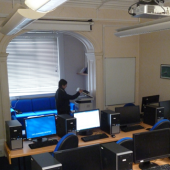
India is challenged by the nexus of environmental degradation and economic growth amidst the paradoxical coexistence of poverty and affluence in their multifarious dimensions. These challenges are directly linked with the conservation and maintenance of the life supporting systems such as land, water, air, and biological diversity. The major causes of environmental degradation are population growth, industrialisation, changes in consumption patterns, and poverty threatening the dynamic equilibrium that could exist between people and ecosystems. In an effort to address these issues, environmental education for sustainable development (EESD) is emerging as an important approach to encourage students to conserve and protect the natural environment in their schools and in their neighbourhoods.
Continue Reading
This study investigated the current energy use perceptions and practices of staff and students within five buildings at the University of Sheffield, UK. A series of focus groups with staff and post-graduate representatives from these buildings explored occupant awareness of energy consumption, perceived level of control over energy use, priorities for reduction and the perceived facilitators and barriers to reduction. Overall, personal awareness and attitudes about the need to conserve energy, the perceived actions and opinions of other users (including University authorities) and perceptions of control over the ease and opportunity to reduce energy consumption were perceived by occupants to relate to whether they would intend to conserve energy in University buildings. Recommendations for encouraging energy conservation focus on engendering greater occupant responsibility for conservation by providing a clear conservation message, participating in energy reduction schemes and providing greater energy usage information. Few papers have investigated occupant understanding of energy use in UK University and Higher Education buildings, despite large reduction targets in the sector. This paper recognises the importance that staff and student engagement will have in the successful achievement of these targets and explores their insights and perceptions.
Continue Reading